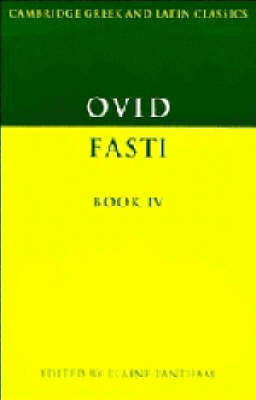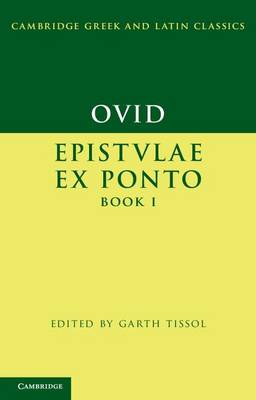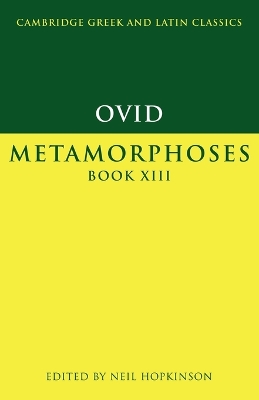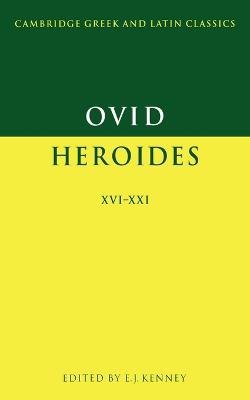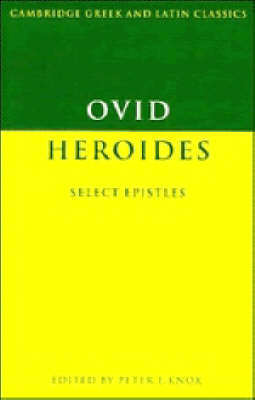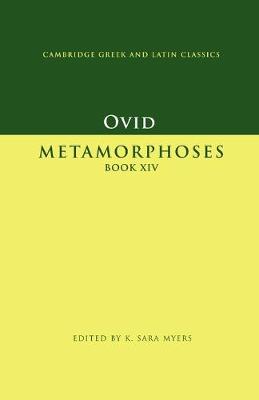Cambridge Greek and Latin Classics
6 total works
Book IV of the Fasti, Ovid's celebration of the Roman calendar and its associated legends, is the book of April and honours the festivals of Venus, Cybele, Ceres, and their cult, as well as the traditional date of the foundation of Rome and many religious and civic anniversaries. Elaine Fantham accompanies her commentary with a revised text and an extended introduction. Besides including surveys of language, style, versification, and textual transmission, the introduction looks at the shifting generic traditions of Greek and Roman elegy, and situates Ovid's composite poem in its Augustan literary and historical context. Other sections explain the recurring religious, astronomical and dynastic material of the Fasti. It has been a particular concern to relate features of Book IV to the other books of the Fasti and to Ovid's other elegiac works, and the Metamorphoses.
When Ovid, already renowned for his love poetry, the Metamorphoses and other works, was exiled by Augustus to Tomis on the Black Sea in AD 8, he continued to write. After five books of Tristia, he composed a collection of verse letters, the Epistulae ex Ponto, in which he appeals to his friends and supporters in Rome, lamenting his lot and begging for their help in mitigating it. In these epistolary elegies his inventiveness flourishes no less than before and his imaginative self-fashioning is as ingenious and engaging as ever, although in a minor key. This commentary on Book I assists intermediate and advanced students in understanding Ovid's language and style, while guiding them in the appreciation of his poetic art. The introduction examines the literary background of the Epistulae ex Ponto, their relation to Ovid's earlier works, and their special interest and appeal to readers of Augustan poetry.
Book XIII of Ovid's Metamorphoses presents a wide variety of brilliant episodes, from the rhetorically charged contest between Ulysses and Ajax over the arms of Achilles, to the tragic tale of Hecuba and her gruesome revenge, to the amusing story of Polyphemus' unrequited love for Galatea and its bloody conclusion. This edition discusses in detail Ovid's treatment of his sources and sets out the ways in which he has adapted earlier literature as material for his novel work. Guidance is offered on points of language and style, and the Introduction treats in general terms the themes of metamorphosis and the structure of the poem as a whole.
This is Ovid's wittily imagined version of the letters exchanged by three famous pairs of lovers. Heroides XVI-XXI constitute an artfully constructed triptych: Hero and Leander's tragedy of high romance and fleeting happiness framed by two ironic comedies, that of Paris and Helen distinctly black, that of Acontius and Cydippe ending the book on a note of tantalising ambiguity. This is the first edition of these poems with commentary in any language since 1898. It provides a substantially improved text, together with all the guidance needed by students for the understanding of Ovid's Latin and the appreciation of his poetic art. The Introduction offers the first adequate discussion ever published of the poet's treatment of his literary sources and models, and deals succinctly but decisively with the question of authorship.
Ovid's Heroides, a collection of twenty-one epistles in elegiac verse, consists of two groups, the first comprising fourteen poems addressed by heroines of mythology to their absent lovers or husbands. In this edition, Professor Knox offers a commentary on seven of these epistles, addressing problems of language and style, and focusing on the relationship of the Heroides to the classic works of Greek and Roman literature on which Ovid bases his representation of these women. In addition, he has included a commentary on the Epistula Sapphus, a separate poem of doubtful authorship which was composed in the manner of Ovid and is believed by many to be by him. The Introduction provides an account of the genre, a survey of language, style and metre, and an outline of the problems concerning the authenticity of parts of the collection.
In Book XIV of the Metamorphoses Ovid takes his epic for the first time into Italy and continues from book XIII his close intertextual engagement with Virgil's Aeneid. His tendentious treatment of his model subordinates Virgil's epic plot to fantastic tales of metamorphosis, including the erotic Italian tales of Circe Glaucus, and Scylla, and Picus, and Canens. Other Roman myths include Pomona and Vertumnus, as well as events from Romulus' reign. The deifications of Aeneas and Romulus anticipate the poem's closing episodes of imperial apotheosis. This commentary provides guidance to advanced undergraduate and graduate students for understanding Ovid's language, style, artistry, and allusive techniques. The introduction discusses the major structures, themes, and stylistic features of book XIV, its place within the poem as a whole, and Ovid's interpretive imitation of Virgil's Aeneid.
